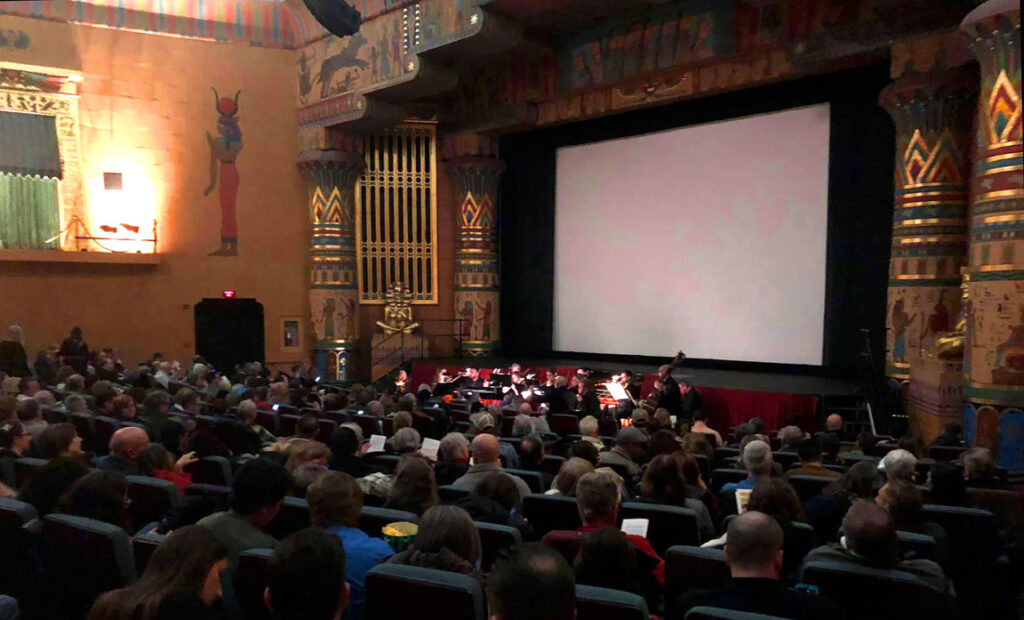I’ve heard the term “baby pictures” used when referring to a composer or other artist’s early work. They were made at a certain point in the artistic arc of a particular creative person, someone whose work has developed and matured and improved. Those early works don’t get revisited and revised. But I really needed to toss out a baby picture and take a new one.
In I think 1999 I was approached by Masanobu Ikemiya after a show I played about writing a score for his New York Ragtime Orchestra. We decided on a film, Chaplin’s The Adventurer, and off I went. The NYRO premiered the score in the summer of 2000.
That was the first of what is now ten orchestral scores for silent comedy shorts, plus one for a feature, that I’ve now composed. Most of the scores I’ve done were for the Boise Philharmonic’s Youth Symphony (formerly known as the Treasure Valley Youth Symphony) or for the Philharmonic’s Chamber Ensemble. I only did The Adventurer and then The Immigrant for MasEnobu’s group, and then the Boise Phil found me in 2004.
I’ve continued to license the scores I’ve composed over the last fifteen years. Whenever I’d had a chance to piano-accompany for any other shorts I scored for orchestra, I’d tried to use that score or as much of it as I could remember. The Immigrant, One Week, Cops and Wrong Again are films I play a few times a year and the scores for them pretty much work on piano.
Over the last several years, my Adventurer score has gradually slid out of sync with my scoring sensibilities. When I’ve gone on the journey with this film during a show and played as much of my composed score as I could muster, in my gut there things about it that didn’t feel right. The audience of course didn’t notice and the film always went over really well. But I kept finding myself veering away from what I’d written during a show.
I’ve grown a lot as an accompanist, as a composer of orchestral scores over the years, Additionally, performing the piano/celeste part for four performances of Chaplin’s City Lights with the Arctic Philharmonic under the direction of Timothy Brock five or six years ago, has also informed my scoring sensibilities when it comes to Chaplin.

My old (and I do mean old) score synchs with a public domain edition of the film, which was fine 15-20 years ago when I was sending out my 16mm print with the score. After a valiant misfire a couple years ago trying to make the old score adhere to the new Chaplin Project restoration, I decided I needed to overhaul my score. More like a gut renovation, actually.
I programmed the film for three consecutive shows at different venues last fall. I went on the journey of the film with an audience and revised my sense of the film’s flow. In composing new music and re-re-revisiting the film, something caught my eye in a newspaper insert in the film that further informed me. You can read about that here, and I talked about this on my podcast.
I also realized that this is one of the very few Chaplin films in which Charlie’s character does not fall in love with Edna’s character, and that that love interest does not drive the bulk of the film’s forward motion. Charlie is on the lam. Period. And while there are segments where Charlie is sitting or standing and having little routines, they break up a need to evade a police force that’s in place from the first shot of the film.
It’s different from the other Mutual shorts, in that way, and that’s what I needed to acknowledge and underscore in revisiting the film.
The new score for The Adventurer (1917) had its world premiere in Boise, ID on Saturday Feb 15 at the historic 1927 Egyptian Theatre. It was performed by the Boise Philharmonic Chamber Ensemble under the baton of Eric Garcia. The silent film fan base in Boise that we’ve developed over the last sixteen years or so who attend Saturday’s show may have recognized a theme or two, but trust me…this is a new score, and one that supports the film much better.
The film went over extremely well, and the night was a big success. Now…what to pick to score for next year?